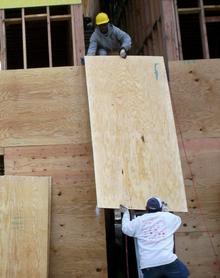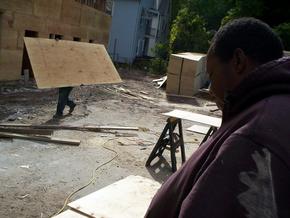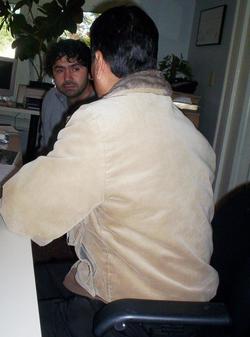 New lofts for artists are going up in Westville. Some of the undocumented workers hired for the job say their boss stiffed them, taking advantage of their fears of being deported. Their Jamaican-born boss denies it and claims he’s being hassled because he’s black. Call it an immigrant tale — or an immigrant vs. immigrant tale — about how modern-day cities are rebuilt.
New lofts for artists are going up in Westville. Some of the undocumented workers hired for the job say their boss stiffed them, taking advantage of their fears of being deported. Their Jamaican-born boss denies it and claims he’s being hassled because he’s black. Call it an immigrant tale — or an immigrant vs. immigrant tale — about how modern-day cities are rebuilt.
The project in question is called Arts Loft West. With the help of $5.3 million state and city money, a not-for-profit agency, Mutual Housing, is building eight artists work/living spaces plus four storefronts at the junture of Whalley Avenue, Fountain Street, and West Rock Avenue by the healthily beating heart of Westville Village.
A construction company hired for the project, Lab Restoration and Construction Corp., has been hiring workers from Ecuador, Mexico, and other nations south of the U.S. border. Three of the workers went to an immigrants’ rights group, Unidad Latina en Acci√ɬ≥n (Latinos United in Action), complaining they’d been stiffed on their wages. One of them, Manuel (not his real name), said in an interview Friday that he came here illegally from Mexico to earn more money to send to his family on a farm back home. He and a friend landed the job when the boss was driving by them in a white van in Westville one morning in July, stopped, and offered them $9 an hour to work for him. Manuel said his pay eventually went up to $10 an hour — when he was actually paid, which became increasingly rare — as a worker’s helper for the month and a half he spent on the job until quitting in late August. He would carry wood, hold planks while carpenters hammered and nailed, and generally perform unskilled manual labor. Finally, he and two others had enough of waiting for unpaid wages and quit.
Unidad Latina organizer John Lugo confronted the boss on the job, who denied stiffing Manuel and his co-workers. According to Lugo, the boss claimed the workers knew they’d be paid late because of cash-flow problems. When Lugo called the state labor department to complain, the boss offered to pay the more than $4,000 in back wages within a week, according to Lugo.
When the week passed, the boss came up with much of the money. But about $1,000 owed to two of the workers was missing. The boss insisted the workers never worked all those hours. An argument ensued. According to Lugo, the boss threatened to call immigration officials on the workers, who are in the U.S. illegally.
“If I was white, you wouldn’t” be here, the boss then said, according to Lugo. The boss is black and from Jamaica.
“You’re an immigrant, just like them. This is not about color,” replied Lugo, who came to the U.S. from Colombia.
To which the boss said, according to Lugo, “If I see them around here, I will call immigration. I just found out they don’t have papers.”
“Give me a break. You knew from the beginning they didn’t have papers,” Lugo said.
Lugo then brought the complaints to Mutual Housing, whose director has promised to make good on the rest of the claims. (She could not be reached for comment Friday.)
Lugo wants not just the workers’ money back, but the construction boss’s firm fired, as well. He said that other workers on the job have left without getting paid, but without complaining, for fear of facing deportation.
“They’re lucky,” Lugo said of Manuel and his two co-workers who came forward. “They’re getting their money back. What about the other people? We have no way of tracing them.”
“This is a tactic of many contractors. They hire a lot of people and don’t pay them. The [workers] don’t have the resources [to fight back], or they are frightened,” Lugo said. He currently is working with immigrants in Waterbury who say they’re owed $10,000 on a construction job.
The Boss’s Side
The boss is named Art Banton. He denied the whole story as he watched his Latino workers on the site Friday afternoon.
 “I came to this country. Why would I want to call immigration on them? I am not American-born. I would not do such things,” said Banton, who’s 47. “Everybody got paid on this job.”
“I came to this country. Why would I want to call immigration on them? I am not American-born. I would not do such things,” said Banton, who’s 47. “Everybody got paid on this job.”
He said he happily hires immigrants. “If you’re willing to work and you have the skills I need, as long as you’re legal, I will hire you. If you can show me documents, I’ll hire you.”
Informed that Manuel said he and his co-workers are undocumented, Banton replied, “I’m not an immigration officer,” so he can’t be expected to know for sure if documents are legitimate.
He does know, he said, why people are raising questions about him. “When a black contractor has a job in New Haven,” he claimed, “he’s targeted. This business, according to white America,” is not for black people. “When we do a little job, all different kinds of people ask us questions. They figure every black man is a convict of a crime.”
Maunel’s Journey
This is Manuel’s seventh stay in New Haven since 1987, he said in an interview Friday, through John Lugo’s translation. Manuel, who is 50, has crossed the border illegally each time, sometimes facing great hardship. He said it’s worth it, and he’s not scared to press complaints against people like Abanton. He wants to earn more money for his family than he can make growing tomatoes and corn on his small farm in the village of Zacualpan in the Mexican state of Tlaxcala. He continually returns to Zacualpan because he misses his wife and three daughters, he said, even though that means paying a “coyote” to sneak him across the border again.
He continually returns to Zacualpan because he misses his wife and three daughters, he said, even though that means paying a “coyote” to sneak him across the border again.
His most recent trip here was in the summer of 2004. He paid a coyote $2,400. The coyote snuck him and others across the border, where they walked through the Arizona desert for three days. Their food lasted one day, their water, two. After the third day, they were caught by immigration officials and returned to Mexico.
The coyote led them to a different spot four days later. They went to a border checkpoint and, armed with knowledge of when the guards changed duty, someone told them when they could simply walk past, which they did. They were told to go to a McDonald’s, where someone picked them up, drove them to Phoenix, put them on a plane. From New York, Manuel made his way back to New Haven, where he has relatives.
He has found a new job, as a busboy in a local restaurant, since leaving the Westville construction job. He said he’s happy to be here, although life has become more dangerous for immigrants in New Haven, he said. Because most undocumented workers lack bank accounts, muggers assume they carry a lot of cash on them. Manuel said he was friendly with the immigrant who was stabbed to death earlier this year by a mugger in Fair Haven. That immigrant, too, came from Manuel’s home village of Zacualpan, a long way from New Haven.